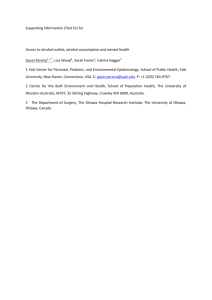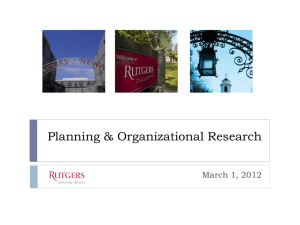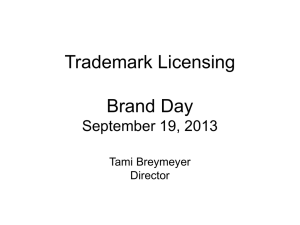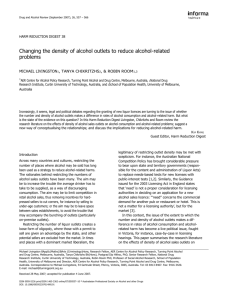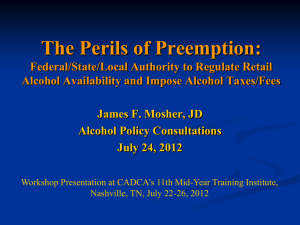`Outlet density and cumulative impact` James
advertisement
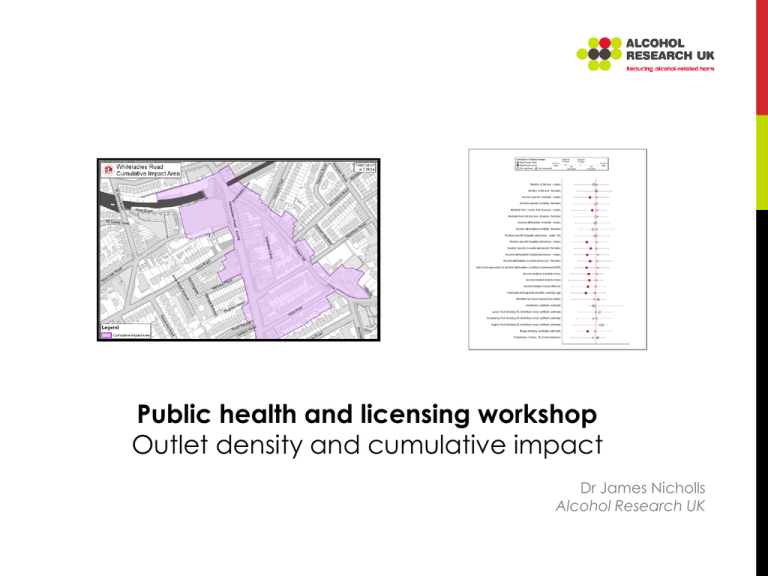
Public health and licensing workshop Outlet density and cumulative impact Dr James Nicholls Alcohol Research UK Three issues Public health licensing objective for cumulative impact areas Research on outlet density, consumption and harm Scotland and ‘overprovision’ policies Cumulative impact policies A ‘rebuttable presumption that applications [which add to cumulative impact] will normally be refused’ (Sections 13.19-38 of Section 182 Guidance) Consensus that outlet density exacerbates particular harms 158 CIAs across 93 licensing authorities in 2012 [134 / 83 in 2010] Health evidence valid in preparing a policy (s. 13.23), but no health objective for it to address. ‘We want to ensure that licensing authorities are able to take alcohol-related health harms into consideration when making decisions about cumulative impact policies (CIPs) which can be used to manage problems linked to the density of premises in specific areas. We consider that a new health-related objective for alcohol licensing related specifically to cumulative impact is the best way to achieve this.’ Objections to health objective A&E admissions already covered by crime and disorder objective No link between density and health at local level A ‘bridge to far’ for health involvement in licensing Outlet density: evidence reviews Popova, S. et al. (2009) ‘Hours and days of sale and density of alcohol outlets: Impacts on alcohol consumption and damage: a systematic review’, Alcohol and Alcoholism 44.5 (500-16) Jackson et al. (2009) ‘Interventions on control of alcohol price, promotion and availability for prevention of alcohol use disorders in adults and young people’, NICE evidence review Home Office (2012) ‘Impact assessment: consultation on including a health objective in the Licensing Act 2003 related specifically to cumulative impact’ Outlet density and consumption Jackson et al. (2009): ‘A clear positive association between outlet density and increases in alcohol consumption was observed among both adults and young people. Further limited evidence was also identified that found a positive relationship between alcohol outlet density and alcoholrelated harms.’ Consistent evidence of impact on crime and disorder (though variations by locality and type of outlet) Outlet density and health Theall, K. et al. (2009) ‘The neighborhood alcohol environment and alcohol-related morbidity’, Alcohol and Alcoholism 44.5 (491-9) Livingston, M. (2011) ‘Alcohol outlet density and harm: comparing the impacts on violence and chronic harms’, Drug and Alcohol Review 30 (515-23) Also evidence from Nordic studies following state-level changes in legislation. Outlet density and health: the evidence Theall et al., 2009: ‘Our findings support the notion that alcohol outlets are likely to play a significant role in health outcomes at neighborhood level, irrespective of individual consumption patterns’ Livingston (2011): 10% increase in the number of off-licenses would increase hospital admissions by 1.9% (on-licenses = 0.5%) ‘There was a strong positive association between [off-license] density and rates of alcohol-caused chronic disease.’ ‘Outlet density’ today 1884 2012 Key problems Rebalancing towards the off-trade Capacity v number of outlets Impact of supermarkets on small off-licenses (cf. Forsyth, A. (2012) ‘Shop servers experience of alcohol-related issues and interventions in socially contrasting neighbourhoods’ Alcohol Research UK) Effective proximity measures (especially supermarkets and online) Scale of CIA for health indicators Scale of cumulative impact areas Licensing authorities could introduce a new CIP or ‘extend the geographic area of an existing CIP (potentially to cover the whole licensing authority area) following consideration of health data’ (Health Objective Impact Assessment, p. 5) Croydon’s proposed borough-wide policy is ‘disproportionate and unhelpful … [It] may well be open to challenge and it certainly falls foul of national policy’ (Association of Licensed Multiple Retailers Press Release 25th Feb) Is Government guidance clear enough on this? Licensing (Scotland) Act 2005 Fifth licensing objective: ‘Protecting and improving public health’ Overprovision Requirement for statement on ‘overprovision’ in Statement of Licensing Policy Support for data-gathering Focus on Statements of Licensing Policy Problem of causal relationships – bar is lower for overprovision (risk, rather than undermining objectives) Strong trade resistance – legal challenges Alcohol and Drug Partnerships Community engagement through Licensing Forums


